新概念英语第二册第7课课文详解,答案及写作
新概念英语第二册第 课课文详解 答案及写作

课文解析Africa 非洲→ African 非洲的negro/black people 以前对黑人的称呼,是对黑人的种族歧视The African Americans 美国黑人Asia 亚洲→ Asian 亚洲的America 美洲→ American 美洲的Europe 欧洲→ European 欧洲的Customs House 海关custom 风俗,习惯customs 风俗,习惯(pl.),海关customs duties 海关关税customer 顾客take…off1) 把…从…取下来eg. You should take your toys off the table. 你应当把玩具从桌子上拿下来。
2) 起飞eg. The plane took off very smoothly. 飞机顺利地起飞。
3) 从(价格)减去,减价eg. They are taking 50% off all goods in that boutique. 那家时装精品店所有服装打五折。
4) 脱掉(衣,帽,鞋等),取下(眼镜,戒指等)eg. Take your coat off. 脱下外套吧。
take after 长的像take away 拿走;夺去;使离去take back 拿回,收回take…for 认为;以为;误以为take it out of (口)使(某人)筋疲力尽take与其它词的组合take a rest 休息一下take temperature 测体温,测温度take a walk 去散步take a look 看一眼take pictures 拍照take one's advice 遵循/按照某人意见be on the take 索贿(口)take it or leave it 不要就拉倒take some medicine 服药take a taxi 打车to one's surprise 令某人吃惊的是to one's joy 令某人高兴的是or: to one's delightto one's sorrow 令某人伤心的是to one's disappointment 令某人失望的是eg. This is my first date. But to my surprise, the girl didn't turn up.这是我第一次约会,但令我吃惊的是,那女孩没来。
(完整版)新概念英语第二册:第7课课文详解及语法解析
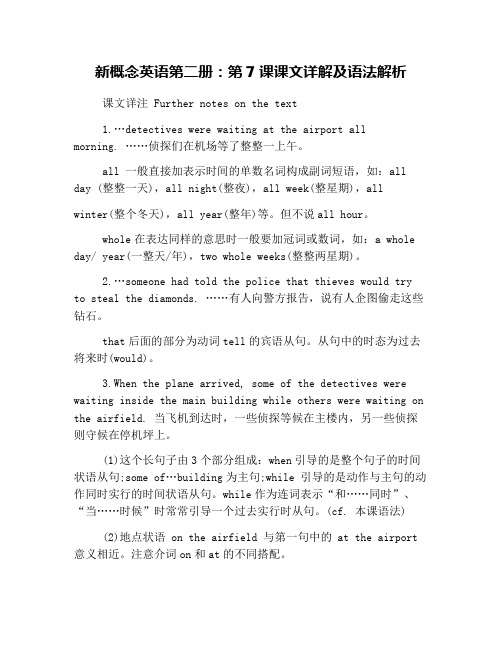
新概念英语第二册:第7课课文详解及语法解析课文详注 Further notes on the text1.…detectives were waiting at the airport all morning. ……侦探们在机场等了整整一上午。
all 一般直接加表示时间的单数名词构成副词短语,如:all day (整整一天),all night(整夜),all week(整星期),allwinter(整个冬天),all year(整年)等。
但不说all hour。
whole在表达同样的意思时一般要加冠词或数词,如:a whole day/ year(一整天/年),two whole weeks(整整两星期)。
2.…someone had told the police that thieves would try to steal the diamonds. ……有人向警方报告,说有人企图偷走这些钻石。
that后面的部分为动词tell的宾语从句。
从句中的时态为过去将来时(would)。
3.When the plane arrived, some of the detectives were waiting inside the main building while others were waiting on the airfield. 当飞机到达时,一些侦探等候在主楼内,另一些侦探则守候在停机坪上。
(1)这个长句子由3个部分组成:when引导的是整个句子的时间状语从句;some of…building为主句;while 引导的是动作与主句的动作同时实行的时间状语从句。
while作为连词表示“和……同时”、“当……时候”时常常引导一个过去实行时从句。
(cf. 本课语法)(2)地点状语 on the airfield 与第一句中的 at the airport 意义相近。
注意介词on和at的不同搭配。
新概念英语第二册课后习题答案详解

新概念英语第二册课后习题答案详解-1-40(总45页)--本页仅作为文档封面,使用时请直接删除即可----内页可以根据需求调整合适字体及大小--新概念英语第二册课后习题答案详解Lesson 11. b选b最为正确。
因为a.d.都与课文内容不符合,也不合乎逻辑;c.的意思是“他们没有注意他”,而作者的意图并不是想让他们注意他,而是想让他们停止谈话。
所以选b. 最能表达作者当时心里的感受。
2.c其余3个答案都与原句意思不符合。
3.b因为a. to 不对,可以是He went to the theatre;c. into 也不对,可以是He went into the theatre;d. on更不符合语法,表示在某一个地方用介词in 或at, in 表示在大的空间,如国家,城市等,at 则表示在小的地点或空间,如atthe office, at the theatre 等, 所以选b.是正确的。
4.db. above(在……上方);c. ahead of (在……的前面,在……之前)不和behind 对应,也不强调位置的前后顺序。
a. before 和 d. infront of 都是和behind对应的,都有“在……前面”的意思。
但in front of 更具体的强调位置,而before则包含更宽泛的意思,即时间上,空间,次序,登记,重要性方面的“在……前面”5.c因为用 a. Where, b. why, d. when 提问都不符合逻辑,都不是针对状态提问的,只有How提问,才能用Angry回答。
6.ab. they 只做主语; c. their只能做定语;d. us 虽然可以做宾语,但与前一句意思不符合。
7.da. none是代词,很少用在名词前面;b. any 只能用在否定句或疑问句中;c. not any 不符合语法,因为前面没有助动词did.. chair(椅子), c. armchair(手扶椅) d. class(班级) 这3个选择都和seat的意思不符合。
新概念英语第二册第七课课文详解
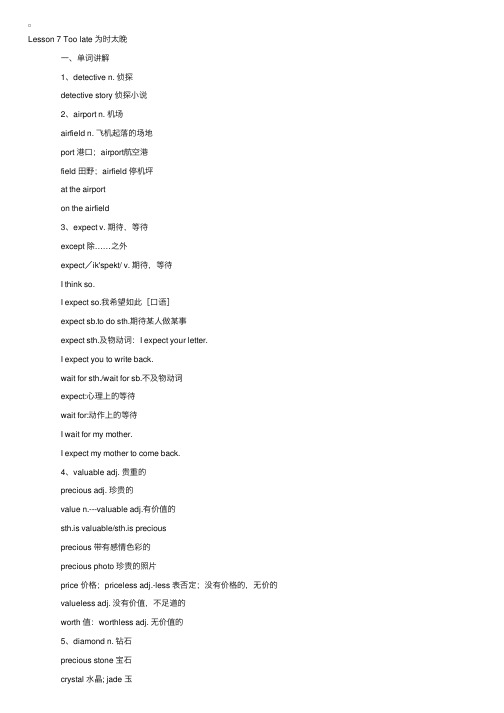
Lesson 7 Too late 为时太晚 ⼀、单词讲解 1、detective n. 侦探 detective story 侦探⼩说 2、airport n. 机场 airfield n. 飞机起落的场地 port 港⼝;airport航空港 field ⽥野;airfield 停机坪 at the airport on the airfield 3、expect v. 期待,等待 except 除……之外 expect/ik'spekt/ v. 期待,等待 I think so. I expect so.我希望如此[⼝语] expect sb.to do sth.期待某⼈做某事 expect sth.及物动词:I expect your letter. I expect you to write back. wait for sth./wait for sb.不及物动词 expect:⼼理上的等待 wait for:动作上的等待 I wait for my mother. I expect my mother to come back. 4、valuable adj. 贵重的 precious adj. 珍贵的 value n.---valuable adj.有价值的 sth.is valuable/sth.is precious precious 带有感情⾊彩的 precious photo 珍贵的照⽚ price 价格;priceless adj.-less 表否定;没有价格的,⽆价的 valueless adj. 没有价值,不⾜道的 worth 值:worthless adj. ⽆价值的 5、diamond n. 钻⽯ precious stone 宝⽯ crystal ⽔晶; jade ⽟ diamond ring 钻⽯戒指 6、steal v. 偷 steal,stole,stolen steal sth. 偷(某物) rob sb. 抢(某⼈) My wallet was stolen. I was robbed. rob the bank 7、main adj. 主要的 main building; main street main sentence; main idea 不与⼈连⽤ 8、guard n. 警戒,守卫 life guard 救⽣员/body guard 保镖 ⼆、语法重点--宾语 1、v.+prep.介词+宾语 come and look at... I am looking for... 2、 v.+prep. 介词/adv.代表不同的意思 look at 看;look after照料 3、v.+prep./adv.+宾语(n.) v.+宾语(n./pron.)+prep./adv. take off the coat……take the coat off/take it off coat n.作宾语 put on your shoes/put your shoes on/put them on 笔记: 宾语的位置和词性取决于施加动作的动词(在乐加乐学过新⼆的孩⼦应该知道宾语的构成和位⼦) 介词出现,⼀定要有宾语,所以 v.+prep.+宾语(n.) 副词可省略.v.+宾语(n./pron.)+adv. 或 v.+adv.+宾语(n.) at,after prep; off adv. vt.+宾语 vi.+prep.+宾语 take vt./look vi. I always take money with me. 附上及物动词和不及物动词讲解: A 有些动词只是及物动词; 它们不可以单独⽤,后⾯必须跟宾语。
新概念英语第二册第7课课文详解及语法解析

新概念英语第二册第7课课文详解及语法解析课文详注 Further notes on the text1.…detectives were waiting at the airport all morning. ……侦探们在机场等了整整一上午。
all 一般直接加表示时间的单数名词构成副词短语,如:all day (整整一天),all night(整夜),all week(整星期),allwinter(整个冬天),all year(整年)等。
但不说all hour。
whole在表达同样的意思时一般要加冠词或数词,如:a whole day/ year(一整天/年),two whole weeks(整整两星期)。
2.…someone had told the police that thieves would try to steal the diamonds. ……有人向警方报告,说有人企图偷走这些钻石。
that后面的部分为动词tell的宾语从句。
从句中的时态为过去将来时(would)。
3.When the plane arrived, some of the detectives were waiting inside the main building while others were waiting on the airfield. 当飞机到达时,一些侦探等候在主楼内,另一些侦探则守候在停机坪上。
(1)这个长句子由3个部分组成:when引导的是整个句子的时间状语从句;some of…building为主句;while 引导的是动作与主句的动作同时实行的时间状语从句。
while作为连词表示“和……同时”、“当……时候”时常常引导一个过去实行时从句。
(cf. 本课语法)(2)地点状语 on the airfield 与第一句中的 at the airport 意义相近。
注意介词on和at的不同搭配。
新概念第二册课后答案详解

11 i have to take this cap in to have new brakes fitted.
12 how long is it since you had to see a doctor?
10. d
本句需要选一个同前一句中的词组unnatural sizes (出奇得大)含义相同的形容词,才能使它与前一句意义保持一致。a. expensive (昂贵的);b. overfished (对鱼类过量捕捞的);c. lovely (可爱的);d. huge (巨大的)中,只有d. huge与unnatural sizes含义相同,所以选d.
6 we have not had the letter sent to his new address.
7‘i will have the package sent to you,’she promised.
8 do you have to go so soon?
9 are you going to have this suit cleaned?
8.ba. chair(椅子),c. armchair(手扶椅) d. class(班级)这3个选择都和seat的意思不符合。seat是”座位,座席”的意思。强调的是可供坐下的地方,不是具体的椅子。只有b. place是seat的同义词。
9.ab. big(大的)指体积;c. tall(高的)指身材;d. large(大的)指空间和面积。
nephew才能准确说明他们的关系。11. da. food(食品),b. dinner(正餐),c. lunch(午餐)这3个词都不能同breakfast划等号。只有d.a meal(一顿饭)可以等同于breakfast,所以应该选d.
新概念英语第二册课后答案
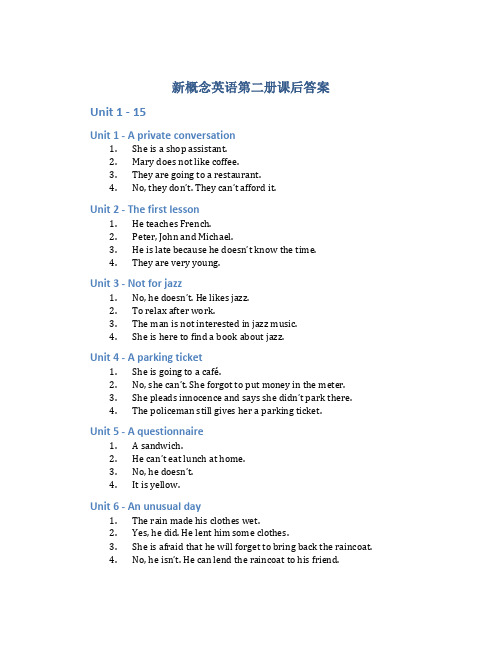
新概念英语第二册课后答案Unit 1 - 15Unit 1 - A private conversation1.She is a shop assistant.2.Mary does not like coffee.3.They are going to a restaurant.4.No, they don’t. They can’t afford it.Unit 2 - The first lesson1.He teaches French.2.Peter, John and Michael.3.He is late because he doesn’t know the time.4.They are very young.Unit 3 - Not for jazz1.No, he doesn’t. He likes jazz.2.To relax after work.3.The man is not interested in jazz music.4.She is here to find a book about jazz.Unit 4 - A parking ticket1.She is going to a café.2.No, she can’t. She forgot to put money in the meter.3.She pleads innocence and says she didn’t park there.4.The policeman still gives her a parking ticket.Unit 5 - A questionnaire1. A sandwich.2.He can’t eat lunch at home.3.No, he doesn’t.4.It is yellow.Unit 6 - An unusual day1.The rain made his clothes wet.2.Yes, he did. He lent him some clothes.3.She is afraid that he will forget to bring back the raincoat.4.No, he isn’t. He can lend the raincoat to his friend.Unit 7 - Is that you, John?1.He d oesn’t think it is John’s voice.2.He has lost his wallet on the train.3.No, he didn’t. He found £20.4.He should return the money.Unit 8 - A coffee break1.No, she doesn’t drink coffee.2.She wants to buy some milk.3.No, he doesn’t. He is going to buy some lemon t ea.4.The tea costs £1.80.Unit 9 - A matter of seconds1.In a library.2.She asked the man to return the book to the library.3.No, she doesn’t have enough money to pay the fine.4.She gets a letter from the library.Unit 10 - When were you born?1.He was born on May 5th, 1965.2.His father was born in 1935.3.Yes, he does. He is a schoolteacher.4.He is very tired.Unit 11 - The best and the worst1.In Rome and Paris.2.Rome was the most interesting place he visited.3.The weather in India was the worst.4.He doesn’t know. He hasn’t been to Switzerland. Unit 12 - New Zealand1.It is a small country in the South Pacific.2.There are three main islands.3.The capital city is Wellington.4.The people there are friendly.Unit 13 - Work and play1.He is a teacher.2.Teacher to students.3.He can’t stay with his friends because he has to work.4.He can’t. He has work to do.Unit 14 - A museum for everyone1.Yes, it does.2.They can touch everything in the museum.3.Yes, they have. They enjoyed their visit very much.4.They don’t have to pay any money.Unit 15 - Paying the bill1.They had lunch at a restaurant.2.They pay first and then have lunch.3.They forget to bring any money.4.They invite the man to have some coffee.ConclusionThe above answers are provided for the exercises in the New Concept English Book 2. Go through the questions and compare your answers with the suggested responses to check for correctness. Practicing and reviewing these exercises will help enhance your understanding of the course material and improve your English language skills.。
新概念英语 第二册 lesson 7 单词、课文、课后题

• on the airfield.在停机坪上 • 当飞机到达时, 一些侦探等候在主楼内, 另一些侦探则守候在 停机坪上.
Two men took the parcel off the plane and carried it into the Customs House.
• Two men两个人
• • • • took the parcel off...把包裹拿下来 carried 搬 (表示看得很重) Customs House 海关 有两个人把包裹拿下飞机, 进了海关.
The plane was late and detectives were waiting at the airport all morning. They were expecting a valuable parcel of diamonds from South Africa. A few hours earlier, someone had told the police that thieves would try to steal the diamonds. When the plane arrived, some of the detectives were waiting inside the main building while others were waiting on the airfield. Two men took the parcel off the plane and carried it into the Customs House. While two detectives were keeping guard at the door, two others opened the parcel. To their surprise, the precious parcel was full of stones and sand!
新概念英语第二册第七课课文

新概念英语第二册第七课课文全文共3篇示例,供读者参考篇1A Working DayYo wassup guys! Today I'm gonna give y'all the lowdown on this reading we did in class about a dude named Eric Walker's typical work day. At first it sounds like a total snoozefest, but trust me, this one's got some twists and turns that'll keep you on your toes!So it starts off with Eric waking up at 7 am to the sound of the radio blaring some tunes. Seems pretty standard so far, right? But get this - he leaves the radio on while he showers and gets ready! I can barely function without my morning playlist, but having an actual radio going while I'm trying to wake up sounds like a one-way ticket to Headache City.Anyway, after his sonic shower routine, he heads downstairs for a classic English brekky - eggs, bacon, toast and coffee. Again, nothing too crazy here. Buttttt then it takes a turn for the weird - Eric straight up reads his morning paper WHILE shoveling food into his mouth! How's my dude not choking or spilling crumbsand coffee all over those pristine newspaper pages? That's some serious multi-tasking skills right there.Once he's refueled, it's off to the office for Eric. But not before throwing on his suit and tie - talk about a blast from the past! I can count on one hand the number of times I've had to wear a full suit, and I'm sure most of you guys are the same. We're talking slacks, shirt, jacket, the whole nine yards. I'm sweating just thinking about having to get all dressed up like that for the daily grind.Eric's commute is pretty tame - he hops in his car and fights through the usual morning traffic. Sounds exactly like what my parents deal with on their way to work. No hoverboards or teleportation devices in sight. How retro!When he finally makes it to the office, Eric starts off by sorting through the mail and checking over any urgent documents. Mail? Like...physical letters and packages? What is this, the 1800s? I handle 99.9% of my communication digitally nowadays. Having to rifle through piles of paper mail sounds like such a hassle.After that riveting mail check, Eric spends a couple hours typing away at reports and memos on his computer. Okay, now we're finally in the 20th century! He took shorthand notes duringsome meetings too - I had to look that up, and it's basically super fast handwritten note-taking with a bunch of symbols and abbreviations. Sorry Eric, but we've got way more efficient technology for that these days. No more cramped up hands from furious pencil-scribbling required!At noon, Eric takes his lunch break. And you'll never guess what he does...he heads to the staff canteen and buys a salad! Cue the gasps of shock and horror! A salad?? For lunch Who does this madman think he is? Just thinking about eating a sad little pile of leaves and veggies in the middle of the day is making me lose my appetite. Where's the burgers? The pizza? The snack cakes from the vending machine? This is an outrage!Post-Sadness Salad, Eric spends the rest of the afternoon making phone calls, going to more meetings, and typing up more documents. I'm getting majorly bored just hearing about this stuff. Apparently he finally leaves around 5:30 pm - so much for that elusive "work-life balance" we're always being told about these days!The journey home is just as thrilling as the morning commute. Except this time, Eric swings by the grocery store on the way to grab some stuff for dinner. Let me get this straight - dDude went to the actual grocery store...after working a full dayat the office?I'm tired just from listening to this saga! Why didn't he just tap a couple buttons and have everything delivered right to his doorstep?Finally - FINALLY - Eric gets home around 6:30 pm. After being a corporate robot all day, you'd think the man would kick back and demolish a family-sized bag of chips while watching TVor something. But noooo, not Eric Walker! This absolute madman starts cooking an entire meal from scratch. We're talking veggies, meat, pots and pans - the full home-cooked experience!I don't know about you, but after a long day of classes and extracurriculars, the LAST thing I want to do is play Master Chef in the kitchen. My typical evening consists of nuking a frozen meal or ordering some delivery, not this kind of from-scratch cooking insanity!To be honest, I'm getting total Dorothy vibes from this mundane schedule: "...and you were there, and you were there..." Because by 9 pm, Eric has cleaned up after dinner, done some laundry, read a few chapters of a book, watched a bit of TV, and gotten ready for bed. How thrilling.I mean, I give Eric props for being so dutiful and responsible. But sheesh, talk about a total snoozefest of a day! No wonderthat new vidgame or social media app is always looking way more appealing than my homework. If having a "working day" means doing absolutely nothing out of the ordinary besides...working...then you can count me out.Give me something exiting! Give me adventure! A life filled with spontaneous road trips, viral videos to post, the latest tech to obsess over. Anything but Salad Man's oppressively normal routine. Thanks for coming to my TED Talk, fam!篇2An Eye-Opening Lesson on Appearance and RealityAs an eager student striving to improve my English proficiency, I found Lesson 7 from New Concept English Book 2 to be a truly thought-provoking experience. The passage delves into the intricate relationship between appearance and reality, challenging our preconceived notions and compelling us to question the very nature of our perceptions.The lesson begins with a seemingly innocuous conversation between two individuals, Tom and Jim, discussing a peculiar advertisement they stumbled upon in a newspaper. The advertisement, which promised a "priceless" experience for a mere fifty cents, piqued their curiosity, and they decided toinvestigate further. Little did they know that this decision would lead them on a journey of self-discovery and a profound understanding of the dichotomy between what we see and what truly lies beneath the surface.As Tom and Jim ventured to the address provided in the advertisement, they encountered a dilapidated building that hardly exuded the promise of a "priceless" experience. However, their skepticism was soon replaced by intrigue as they were guided through a series of rooms, each more perplexing than the last. The stark contrast between the outward appearance of the building and the captivating experiences within served as a potent metaphor for the central theme of the lesson.One of the most striking moments in the passage was the description of the room adorned with mirrors, where Tom and Jim found themselves surrounded by countless reflections of themselves. This experience forced them to confront their own perceptions of themselves and the world around them, challenging the very notion of what constitutes reality. The mirrors, symbolic of self-reflection and introspection, became a powerful tool for exploring the depths of human experience and understanding.As the passage progressed, Tom and Jim encountered a series of optical illusions and mind-bending exhibits that defied their expectations and challenged their senses. From distorted perspectives to impossible shapes, each room presented a new puzzle for them to unravel, forcing them to question the reliability of their own perceptions.The culmination of their journey was the final room, where they witnessed a breathtaking display of light and sound, a true spectacle that transcended the boundaries of what they had previously deemed possible. This experience served as a poignant reminder that reality often extends far beyond our limited understanding, and that the true essence of life lies in embracing the unknown and embracing the mysteries that surround us.Throughout the passage, the author skillfully weaves a narrative that seamlessly blends philosophical musings with engaging storytelling. The dialogue between Tom and Jim is not only entertaining but also serves as a vehicle for conveying profound insights into the human condition. Their reactions, ranging from bewilderment to awe, mirror the very journey that each reader embarks upon as they navigate the depths of this thought-provoking lesson.Ultimately, Lesson 7 from New Concept English Book 2 is a testament to the power of language and literature to transcend mere linguistic boundaries and delve into the very essence of what it means to be human. It challenges us to question our assumptions, to embrace the unknown, and to recognize that the true richness of life lies in the journey itself, not in the destinations we seek.As a student, this lesson has left an indelible mark on my understanding of the English language and the profound insights that can be conveyed through its mastery. It has inspired me to approach language not merely as a tool for communication but as a gateway to self-discovery and a deeper appreciation of the complexities that lie beneath the surface of our daily experiences.In conclusion, Lesson 7 from New Concept English Book 2 is a brilliant tapestry of storytelling, philosophy, and linguistic mastery, woven together to create a captivating and enlightening experience. It is a reminder that true knowledge extends far beyond the confines of textbooks and classrooms, and that the journey of learning is a lifelong pursuit that requires an open mind, a curious spirit, and a willingness to challenge our preconceived notions of reality.篇3Wow, Lesson 7 was a really intense one! The reading passage was all about the famous British explorer George Mallory and his attempts to climb Mount Everest back in the 1920s. I have to admit, before this lesson I didn't know much about Mallory or the early expeditions to scale the world's highest peak. But this text gave a really fascinating glimpse into that era of adventuring and mountain climbing.The passage starts by setting the scene - describing Mallory as ambitious and determined to be the first to reach the summit of Everest. It mentions how climbing the mountain had become almost an obsession for him after his first attempt in 1921. I can only imagine how driven and single-minded you'd have to be to keep trying to achieve something so incredibly difficult and dangerous, year after year.The narration then goes into some really vivid details about the 1924 expedition that Mallory took part in. I started feeling tense just reading about the grueling journey across the glaciers, climbing through deep snow, and having to hack out steps in the ice. The conditions they faced seemed brutally harsh - things like being blasted by -40C winds, having tents ripped apart, andrunning desperately low on supplies. It's hard to fathom dealing with that sort of extreme environment.What struck me most though was the climbing equipment and gear they had back then. In one part it describes them climbing while "pulling themselves up by leather ropes" and using tools like ice axes and crampons that sound medieval compared to today's high-tech mountaineering gear. Can you imagine trying to scale Everest's icy slopes in hiking boots tied to crude crampon spikes? Just the thought makes my feet go numb!The passage also doesn't shy away from the mortal dangers involved. It starkly states that seven climbers had already died on Everest before Mallory's attempts, which must have weighed heavily on their minds. And then the ominous final line about Mallory and his climbing partner being spotted for the last time only 800 feet from the summit before disappearing, leaving their fate unknown for decades. Chilling stuff.After learning about Mallory's struggles and the heroic spirit of those early Everest pioneers, I have so much more appreciation for what modern climbers go through at extreme altitudes. The passage said that above 25,000 feet, the lack of oxygen made even simple tasks like lighting a stove or tying ashoelace monumentally difficult. And Mallory's team had to climb without bottled oxygen or any of the specialized equipment we take for granted today. Just getting to the higher camps alone must have pushed their physical and mental limits.I'm also amazed by the sheer determination and acceptance of risk those early explorers embraced. As the reading states, when Mallory was asked why he wanted to climb Everest, he gave that famous quote: "Because it's there." A refreshingly simple answer that speaks volumes about the human drive to test our boundaries and achieve the seemingly impossible, regardless of the dangers.After reading this gripping tale, I feel inspired to learn more about Mallory, his ill-fated partner Sandy Irvine, and the other unsung adventurers who blazed the trail in Himalayan mountaineering. While their story didn't have a storybook ending, they embodied a bold pioneering spirit that made future expeditions possible. I have a newfound respect for the audacious dream chasers and frontier pushers of that era.I also couldn't help pondering what thoughts must have raced through Mallory's mind on that final push to the summit, knowing his wife and children were potentially watching him through a telescope back at base camp. Did he realize howfamous and mythologized his story would become? Or was he just utterly focused on overcoming that ultimate test of human endurance? The mystique surrounding his final hours will forever make him an enigmatic cult figure in the annals of exploration.In the end, while the passage doesn't flinch from depicting the grave risks of high-altitude alpinism, it left me feeling strangely inspired rather than discouraged. There's something remarkably vivid and life-affirming about people pushing themselves to the absolute brink of their physical capacities - all out of an innate yearning to discover, to achieve something monumental, or simply answer the human calling to adventure.Mallory's journey was one of grit, suffering, and unfortunately tragedy. But stories like his force us to re-evaluate the comfort zones we settle into and consider what unconquered summits still await the intrepid climbers of today. This lesson has me daydreaming about my own Everest - what's that one extraordinary, impossible-seeming life pursuit I could dedicate myself to, even if it pushes me to the limits? Mallory's legacy will endure as a testament to transcendent human resolve in the face of overwhelming adversity. Not a bad lesson to digest alongside grammar rules and vocab lists.。
新概念英语第二册课后习题答案详解(96课全)

新概念英语第二册课后习题答案详解Lesson 31. c根据课文可以判断出作者不喜欢写明信片,但他很想收到别人寄来的明信片,所以应该选c.d. doesn’t like postcards 不喜欢明信片,和课文的含义不符合,所以不选d.2. a根据课文最后两句话可以判断出:作者作出的“一项重大决定”是给他的朋友们写明信片,可是还是一张没有写成,所以应该选a.3. ca. at 表示在小的地点和空间;b. to 表示方向;d. on 表示在……上;只有c. in 表示在大的空间和地方,如城市国家等,所以选c.4. a只有选a. Who taught ,这句问话才与回答相配。
5. d只有选d. in a friendly way(以友好的方式)才能说明前一句He was a friendly waiter,也合乎语法和逻辑。
而其他3个 a. friend(朋友), b. as friends(作为朋友),c. like friends(像朋友一样)在语法上都讲不通。
6. b本句的时态是一般过去时,应该用动词的过去式形式;a. reads 是第3人称蛋单数现在时形式;c. red 词意思不符合;d. reading 是现在分词形式;b. read 过去式和现在式形式相同,发音不同。
所以只有选b.7. ca. the hole 词意思不对;b. the ball 和 d. all of 不合乎习惯用法;英语中不用the all day, all of day 这样一来的短语。
只有选c. all 才能使句中的词组all day 同前一句中的the whole day 意思相同。
8. c句中的waiter 是“饭店服务员”的意思,他通常在饭店工作,而不在a. public garden(公园),b. shop(商店),d. private house(私宅) 工作,所以选c. restaurant.9. b只有b. borrowed 才与前一句中的lent相对应,而其他3个选择都不是。
新概念英语第二册课后习题答案及解释

新概念英语第二册课后习题答案详解Lesson 11. b选b最为正确。
因为a. d.都与课文内容不符合,也不合乎逻辑;c.的意思是“他们没有注意他”,而作者的意图并不是想让他们注意他,而是想让他们停止谈话。
所以选b. 最能表达作者当时心里的感受。
2.c其余3个答案都与原句意思不符合。
3.b因为a. to 不对,可以是He went to the theatre;c. into 也不对,可以是He went into the theatre;d. on更不符合语法,表示在某一个地方用介词in 或at, in 表示在大的空间,如国家,城市等,at 则表示在小的地点或空间,如atthe office, at the theatre 等, 所以选b.是正确的。
4.db. above(在……上方);c. ahead of (在……的前面,在……之前)不和behind 对应,也不强调位置的前后顺序。
a. before 和 d. infront of 都是和behind对应的,都有“在……前面”的意思。
但in front of 更具体的强调位置,而before则包含更宽泛的意思,即时间上,空间,次序,登记,重要性方面的“在……前面” 5.c因为用 a. Where, b. why, d. when 提问都不符合逻辑,都不是针对状态提问的,只有How提问,才能用Angry回答。
6.ab. they 只做主语; c. their只能做定语;d. us 虽然可以做宾语,但与前一句意思不符合。
7.da. none是代词,很少用在名词前面;b. any 只能用在否定句或疑问句中;c. not any 不符合语法,因为前面没有助动词did. 8.ba. chair(椅子), c. armchair(手扶椅) d. class(班级) 这3个选择都和seat的意思不符合。
Seat是”座位,座席” 的意思。
强调的是可供坐下的地方,不是具体的椅子。
新概念英语课文 第二册1-8课课文及译文
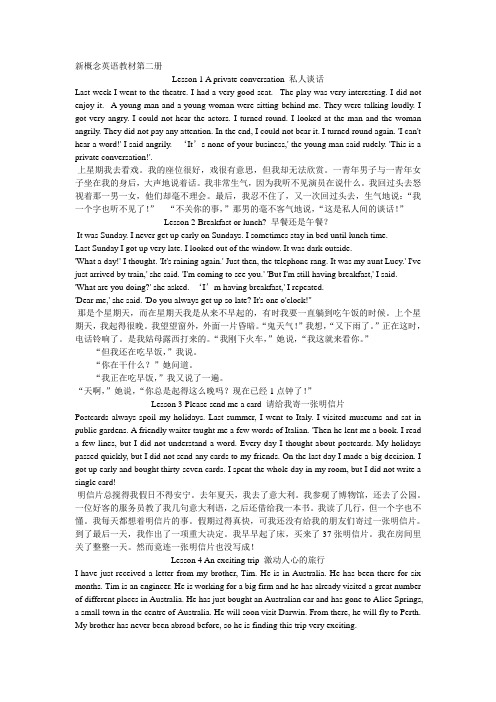
新概念英语教材第二册Lesson 1 A private conversation 私人谈话Last week I went to the theatre. I had a very good seat. The play was very interesting. I did not enjoy it. A young man and a young woman were sitting behind me. They were talking loudly. I got very angry. I could not hear the actors. I turned round. I looked at the man and the woman angrily. They did not pay any attention. In the end, I could not bear it. I turned round again. 'I can't hear a word!' I said angrily. ‘It’s none of your business,' the young man said rudely. 'This is a private conversation!'.上星期我去看戏。
我的座位很好,戏很有意思,但我却无法欣赏。
一青年男子与一青年女子坐在我的身后,大声地说着话。
我非常生气,因为我听不见演员在说什么。
我回过头去怒视着那一男一女,他们却毫不理会。
最后,我忍不住了,又一次回过头去,生气地说:“我一个字也听不见了!”“不关你的事,”那男的毫不客气地说,“这是私人间的谈话!”Lesson 2 Breakfast or lunch? 早餐还是午餐?It was Sunday. I never get up early on Sundays. I sometimes stay in bed until lunch time.Last Sunday I got up very late. I looked out of the window. It was dark outside.'What a day!' I thought. 'It's raining again.' Just then, the telephone rang. It was my aunt Lucy.' I've just arrived by train,' she said. 'I'm coming to see you.' 'But I'm still having breakfast,' I said.'What are you doing?' she asked. ‘I’m having breakfast,' I repeated.'Dear me,' she said. 'Do you always get up so late? It's one o'clock!''那是个星期天,而在星期天我是从来不早起的,有时我要一直躺到吃午饭的时候。
(完整版)新概念英语第二册:第7课课文详解及语法解析
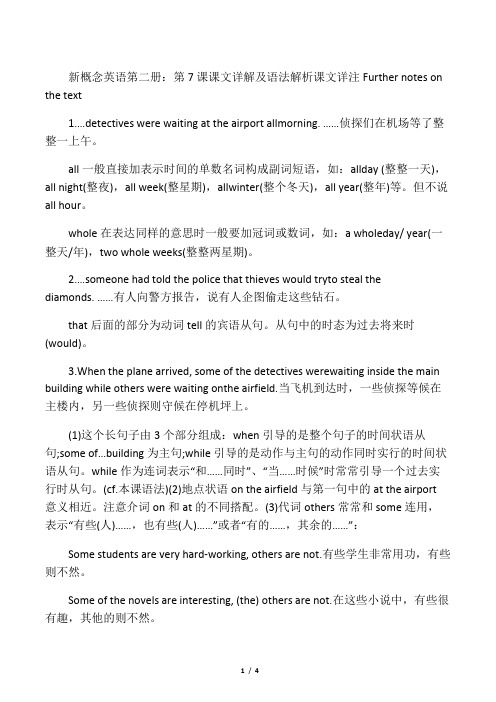
新概念英语第二册:第7课课文详解及语法解析课文详注Further notes on the text1.…detectives were waiting at the airport allmorning. ……侦探们在机场等了整整一上午。
all一般直接加表示时间的单数名词构成副词短语,如:allday (整整一天),all night(整夜),all week(整星期),allwinter(整个冬天),all year(整年)等。
但不说all hour。
whole在表达同样的意思时一般要加冠词或数词,如:a wholeday/ year(一整天/年),two whole weeks(整整两星期)。
2.…someone had told the police that thieves would tryto steal the diamonds. ……有人向警方报告,说有人企图偷走这些钻石。
that后面的部分为动词tell的宾语从句。
从句中的时态为过去将来时(would)。
3.When the plane arrived, some of the detectives werewaiting inside the main building while others were waiting onthe airfield.当飞机到达时,一些侦探等候在主楼内,另一些侦探则守候在停机坪上。
(1)这个长句子由3个部分组成:when引导的是整个句子的时间状语从句;some of…building为主句;while引导的是动作与主句的动作同时实行的时间状语从句。
while作为连词表示“和……同时”、“当……时候”时常常引导一个过去实行时从句。
(cf.本课语法)(2)地点状语on the airfield与第一句中的at the airport意义相近。
注意介词on和at的不同搭配。
(3)代词others常常和some连用,表示“有些(人)……,也有些(人)……”或者“有的……,其余的……”:Some students are very hard-working, others are not.有些学生非常用功,有些则不然。
新概念英语第二册课后习题答案详解及单元测试答案(全)
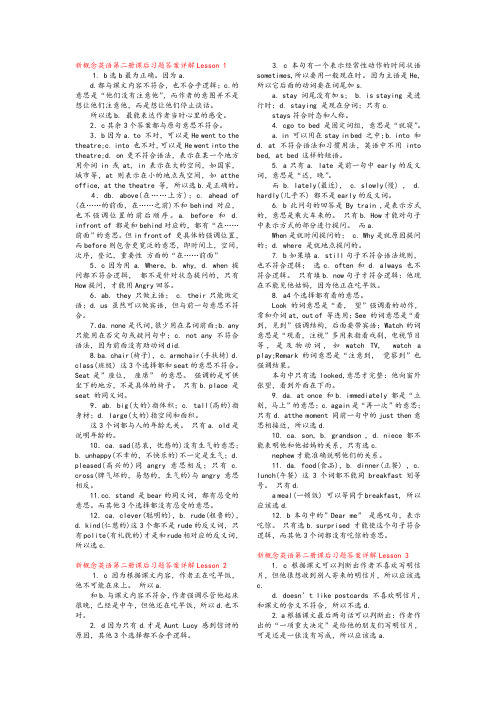
新概念英语第二册课后习题答案详解Lesson 11. b选b最为正确。
因为a.d.都与课文内容不符合,也不合乎逻辑;c.的意思是“他们没有注意他”,而作者的意图并不是想让他们注意他,而是想让他们停止谈话。
所以选b. 最能表达作者当时心里的感受。
2.c其余3个答案都与原句意思不符合。
3.b因为a. to 不对,可以是He went to the theatre;c. into 也不对,可以是He went into the theatre;d. on更不符合语法,表示在某一个地方用介词in 或at, in 表示在大的空间,如国家,城市等,at 则表示在小的地点或空间,如atthe office, at the theatre 等, 所以选b.是正确的。
4.db. above(在……上方);c. ahead of (在……的前面,在……之前)不和behind 对应,也不强调位置的前后顺序。
a. before 和 d. infront of 都是和behind对应的,都有“在……前面”的意思。
但in front of 更具体的强调位置,而before则包含更宽泛的意思,即时间上,空间,次序,登记,重要性方面的“在……前面”5.c因为用 a. Where, b. why, d. when 提问都不符合逻辑,都不是针对状态提问的,只有How提问,才能用Angry回答。
6.ab. they 只做主语; c. their只能做定语;d. us 虽然可以做宾语,但与前一句意思不符合。
7.da. none是代词,很少用在名词前面;b. any 只能用在否定句或疑问句中;c. not any 不符合语法,因为前面没有助动词did.8.ba. chair(椅子), c. armchair(手扶椅) d. class(班级) 这3个选择都和seat的意思不符合。
Seat是”座位,座席”的意思。
强调的是可供坐下的地方,不是具体的椅子。
新概念英语第二册课后练习答案(1-20)
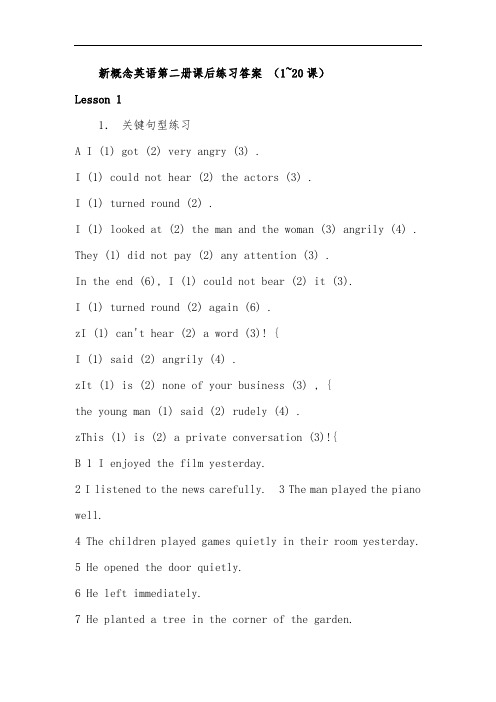
新概念英语第二册课后练习答案(1~20课)Lesson 11.关键句型练习A I (1) got (2) very angry (3) .I (1) could not hear (2) the actors (3) .I (1) turned round (2) .I (1) looked at (2) the man and the woman (3) angrily (4) . They (1) did not pay (2) any attention (3) .In the end (6), I (1) could not bear (2) it (3).I (1) turned round (2) again (6) .zI (1) can't hear (2) a word (3)! {I (1) said (2) angrily (4) .zIt (1) is (2) none of your business (3) , {the young man (1) said (2) rudely (4) .zThis (1) is (2) a private conversation (3)!{B 1 I enjoyed the film yesterday.2 I listened to the news carefully.3 The man played the piano well.4 The children played games quietly in their room yesterday.5 He opened the door quietly.6 He left immediately.7 He planted a tree in the corner of the garden.8 He read the letter quickly in his office before lunch.9 I borrowed a book from the library this morning.10 The cook spoilt the soup.11 We stay at home on Sundays.12 There are a lot of people at the bus stop.13 The little boy ate greedily an apple in the kitchen this morning.14 She draws beautifully.15 I like music very much.16 They built a new school in our village last year.17 The match ended at four o'clock.18 She received a letter from her brother last week. 2.多项选择题答案1 b2 c3 b4 d5 c6 a7 d 8 b 9 a 10 c 11 c 12 cLesson 22.难点练习答案1 What a wonderful garden(this is) !2 What a surprise( this is) !3 What a lot of trouble he is causing!4 What wonderful actors (they are) !5 What a hard-workingwoman (she is) !6 What a tall building (it is) !7 What a terrible film (it is) !8 What a clever boy you are!9 What a pretty girl (she is) !10 What a strange guy (he is) !3.多项选择题答案1 c2 d3 c4 c5 a6 b7 b 8 a 9 d 10 c 11d 12 bLesson 31.关键句型练习题A went (1.1)Õvisited (1.2) Õsat(1.2) Õtaught(1.2)ÕlentÕread(1.3) Õdid notunderstandÕthought (1.4)Õpassed (1.5) Õdid not send(1.5) ÕmadeÕgo up (1.6) Õbought (1.7) Õspent(1.7) Õdid not write(1.8)C ...Roy died last year…left me…spent a lotof money…bought one or two…never went to the cinema…stayed at home…listened tomusic…often lent CDs…they kept them…lost many CDs… 2.难点练习题1 He paid some money to the shopkeeper.2 He handed the prize to me.3 The waiter brought the man a bottle of beer.4 He sold me all his books.5 The shop assistant found me some curtain material.6 He did a big favour for me.7 She showed her new hat to her husband.8 She promised the finder a reward.9 He gave some advice to his son.10 His uncle left some money to/ for him.11 He is teaching us English.12 I bought you this bunch of flowers.13 Bring me that book please.14 He offered a cigarette to me.15 Read the first paragraph to me.16 I've ordered you some soup.17 I owe a lot of money to him.18 Pass your father the mustard.3.多项选择1c 2a 3c 4a 5d 6b7c 8c 9b 10a 11b 12bLesson 121.关键句型练习答案A will sail (1.1); shall meet (1.2); will be (1.3); will set out (11.4-5); shall have(1.5); shallsee (1.5); shall say (1.6);will be (1.6); will take part (1.7) C I shall go to the theatre Reg and I shall see the first performance the producer will give a short speech. He will speak to The play will bevery people will enjoy it very much.2.难点练习答案1 He is not back yet. He will be back in ten minutes.2 A new play is on at the Globe Theatre.3 When the concert was over, We went home.4 They will set out/ off very early tomorrow morning. (Here be off is also possible.)5 You can't take the exam yet. You are not up to it.6 He will be away from home for two months.7 She swam across the English Channel and set up a new world record.3.多项选择题答案1 c2 c3 a4 d5 d6 a7 d 8 a 9 c 10 d 11 a 12 aLesson 131.关键句型练习答案A will be arriving (1.2); will be coming (1.3); will be meeting(1.4); will be singing (1.5);will be staying (1.6); will be trying (1.8)C 1 I'll be ironing the clothes.2 The train will be arriving in a few minutes.3 We'll be seeing you in the morning.4 We'll be watching the match.5 He'll be correcting exercise books.2.难点练习答案1 It's George's.2 It's Jean's.3 It's that woman's.4 I like Keats' poetry best.5 They're the children's.6 They're the soldiers'.7 I'll leave in six hours time. 8 There was a hundred pounds' worth of damage.3多线选择答案1 b2 d3 b4 c5 a6 bLesson 141.关键句型练习答案A 1 I drove on to the next town after I had left a small village.2 I said good morning to him in French as soon as he had got into the car.3 I had nearly reached the town, when the young man said: BDo you speak English?C 1 After she had written the letter, she went to the post office.2 After he had had dinner, he went to the cinema.3 When I had fastened my seat belt, the plane took off.4 We did not disturb him until he had finished work.5 As soon as he had left the room, I turned on the radio.6 He had been very ill before he died.D 1 regretted 2 had begun/ began 3 arrived2.难点练习答案1 Except for2 both of3 Apart from4 askedlask for5 neither oflasked3.多项选择答案1 b2 c3 a4 c5 d6 bLesson 151. 关键句型练习答案A 1a The secretary told me that Mr. Harmsworth would see me. bcMr. Harmsworth will see you. d2 a Mr. Harmsworth said that business was very bad.b cBusiness is very bad.d3 a Mr. Harmsworth told me that the firm could not afford to pay such large salaries.b cThe firm cannot afford to pay such large salaries. dB 1 told would come/would be coming2 said (had) cut3 told had never played4 did he say had done/would do5 did he tell (had) bought/would buy6 said could not7 said (had) worked8 told wrote/writes/had never written9 did you say were/had been10 said would wait2.难点练习答案1 study2 office3 nervous4 afford5 irritable3.多线选择答案1d 2b 3c 4b 5c 6d7a 8d 9c 10c 11c 12bLesson 201关键句型练习答案A Fishing(1.1); catching(11.1-2); catching(1. 3); having spent(1.5); fishing(1.6);fishingˆ sitting(1.8); doing (1.9) C 1 he went out of the restaurant without paying the bill.2 She bought a pair of boots instead of getting a pair of shoes.3 She was afraid of spending the night alone.4 After hearing/having heard the news, she fainted.5 Think carefully before answering my question.6 On seeing the plane coming towards me, I dashed for cover. 2难点练习答案1realized 2It'sˆunderstandˆits 3exciting 4interesting 5exciting 6interested3多项选择答案1b 2c 3b 4b 5c 6b新概念英语第二册课后习题答案详解Lesson 21练习答案Key to written exercises 1.关键句型练习答案A …passing planes can be heard(1.2); The airport was built (1.2); it co uld not be used then(1. 3); a hundred people must have been driven away(11.4-5); this house will be knocked down by a passing plane(11 .6-7); I have been offered a large sum of money(1.7)C 1 A message will be sent immediately. 2 All these goods must be sold.3 I told you the parcel would be received in time.4 The letter h as to be delivered by hand.5 Your letter must have been lost In the post. 2.难点练习答案 A (sample answers)The dog drove the sheep out of the field. The police drove the cro wds back. I drove my car into the garage. B1 home 2 houses 3 house 4 home 3.多项选择题答案1. c根据课文第3-4行Last year, however, it came into use, 只有c. came into use recently 比较接近课文的实际容,而其他3个选择都不符课文容。
新东方新概念英语第二册课后习题答案详解
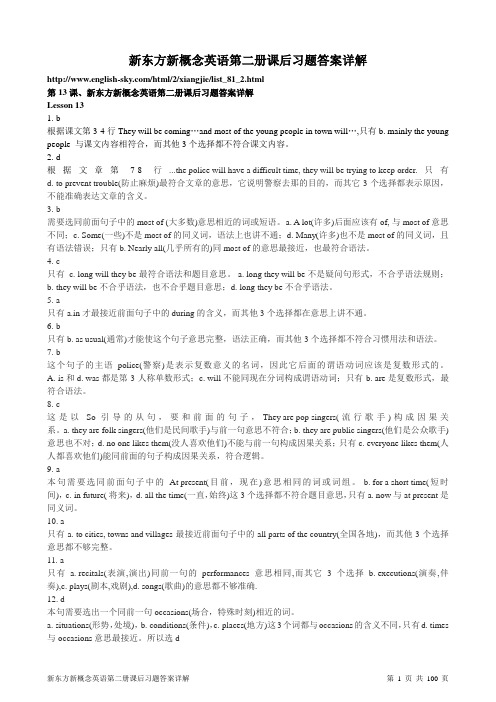
新东方新概念英语第二册课后习题答案详解/html/2/xiangjie/list_81_2.html第13课、新东方新概念英语第二册课后习题答案详解Lesson 131. b根据课文第3-4行They will be coming…and most of the young people in town will…,只有b. mainly the young people 与课文内容相符合,而其他3个选择都不符合课文内容。
2. d根据文章第7-8行...the police will have a difficult time, they will be trying to keep order.只有d. to prevent trouble(防止麻烦)最符合文章的意思,它说明警察去那的目的,而其它3个选择都表示原因,不能准确表达文章的含义。
3. b需要选同前面句子中的most of (大多数)意思相近的词或短语。
a. A lot(许多)后面应该有of, 与most of 意思不同;c. Some(一些)不是most of 的同义词,语法上也讲不通;d. Many(许多)也不是most of 的同义词,且有语法错误;只有b. Nearly all(几乎所有的)同most of 的意思最接近,也最符合语法。
4. c只有 c. long will they be 最符合语法和题目意思。
a. long they will be 不是疑问句形式,不合乎语法规则;b. they will be 不合乎语法,也不合乎题目意思;d. long they be 不合乎语法。
5. a只有a.in才最接近前面句子中的 during 的含义,而其他3个选择都在意思上讲不通。
6. b只有b. as usual(通常)才能使这个句子意思完整,语法正确,而其他3个选择都不符合习惯用法和语法。
7. b这个句子的主语police(警察)是表示复数意义的名词,因此它后面的谓语动词应该是复数形式的。
新概念英语第二册第7课习题答案.docx

新概念英语第二册第 7 课习题答案新概念英语第二册课后习题答案详解Lesson 81. d根据课文的头一句和最后一句,只有 d. 是准确答案,其他 3 个选择都与课文内容不符合。
2. b根据课文第 6-7 行 I like gardens too, but I do not likehard work能够推测b.是准确答案,其他 3 个选择都与事实不符合。
3. ba. larger garden前面没有冠词a, 不合乎语法;c. large garden前面也缺少冠词a,d. largest garden中级前面应该有定冠词the,而且在两者相比时也不能使用级。
所以只有 b. a large garden最符合语法。
4. a本句需要比较级形式。
B. more hard中的hard是单音节词,其比较形式是在词尾加 -er; c. more hardly中hardly(几乎不。
) 词意思不对; d. hardier中原形hardy是表示“强壮的”与课文不符合;只有 a. harder最符合比较级形式。
5. ca. by,b. for , d. from都不能同比较级连用,只有c. than才能够和比较级连用。
6. c同前一句The writer is fond of garden意思相近的句子。
A. They like him意思同前一句相反; b. they like to him有法,也同前一句意思不符合; d. He likes有法,缺少;只有 c. He likes them意思最接近,没有法。
7. ba. in , c. for, d. by都不符合法,在意思上也不通。
只有 b. of才能使句子的意思完整,也合乎法。
8. ba. wins( , ) 做及物,它后面的一般不是人,而是 wind thegame/race 等; c. gains( 利,得 ) 后面的也不是人; d. earns( 得,得 ) 后面的直接也不是人;只有 b. beats 有“(在中)打 / / 取”的意思,而且 beat 后面的能是人,所以 b.9. a只有 a. grow才能使个句子同前面的句子意思相同。
新概念英语第二册课第七课后习题答案详解Lesson

新概念英语第二册第七课课后习题答案详解Lesson 7 1.B 根据课文第3-4行someone had told the police that thieves would try to stealthe diamond 和第8-9行While two detectives were keeping guard at thedoor …可以判断出b. to prevent a robbery 是正确答案,其他3个都不对。
个都不对。
2. C 根据课文最后一句话根据课文最后一句话To their surprise, the precious parcel was full of stonesand sand! 可以推测出c. didn ’t prevent the robbery 是正确的答案。
其他3个选择都不符合课文内容。
3. C 从回答中可以看出,此问句是对地点发问的, a. Why, b. When, d. What 都不能针对地点提问,都不能针对地点提问,只有只有c. Where 是问地点的,可以用At the airport 来回答,所以选c. 4. D 这一句是针对动词宾语提问的,回答是用名词短语A valuable parcel of diamonds . a. Why, b. When , C. where 这几个疑问词都不能针对动词宾语(名词)提问的,只有d. What 可以对名词可以对名词提问。
提问。
5. A 前面句子是过去完成时(hadtold ),表示在过去某一动作或情况发生之前完成的事情,“某人告诉警察。
”这一事件一定是在“飞机到达之前”发生的。
所以正确答案选a. before(在……之前在……之前) 6. C a. in 后面需要有一个表示地点的名词,意思才完整;b. into 在意思上讲不通;d. for 后面需要有一个名词做宾语,意思才完整;只有c. inside(在里面在里面)意思最完整,而且与前半句的动作went into the building相符合,所以选相符合,所以选c. 7. D 4个选择中只有d. took it off 最符合题目意思和语法,所以选d. 8. A b. waiting 是不及物动词,后面不能直接跟名词;c. expecting for 中的expect是及物动词,后面不能加for; d. expecting to 中expect后面不能加to; 只有a. expecting最符合语法。
(完整版)新概念英语第二册课后习题答案详解
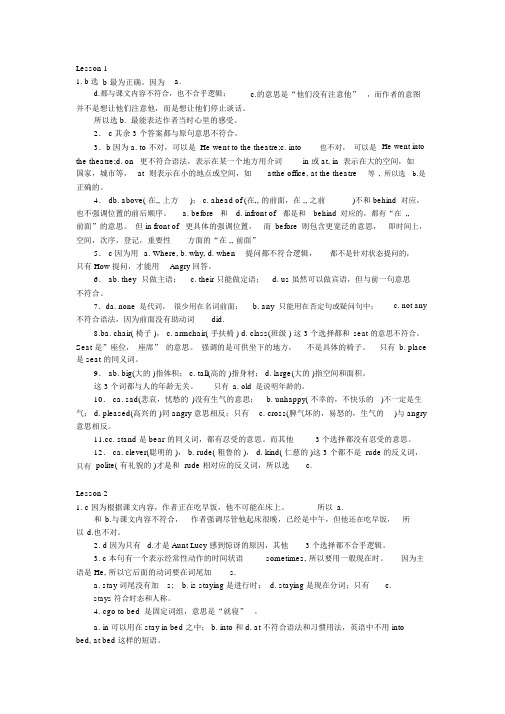
Lesson 11. b 选 b 最为正确。
因为 a.d.都与课文内容不符合,也不合乎逻辑; c.的意思是“他们没有注意他”,而作者的意图并不是想让他们注意他,而是想让他们停止谈话。
所以选 b. 最能表达作者当时心里的感受。
2. c 其余 3 个答案都与原句意思不符合。
3.b 因为 a. to 不对,可以是 He went to the theatre;c. into也不对,可以是He went into the theatre;d. on更不符合语法,表示在某一个地方用介词in 或 at, in 表示在大的空间,如国家,城市等,at 则表示在小的地点或空间,如atthe office, at the theatre等,所以选 b.是正确的。
4. db. above( 在,, 上方); c. ahead of (在,, 的前面,在 ,, 之前)不和 behind 对应,也不强调位置的前后顺序。
a. before和 d. infront of都是和behind对应的,都有“在,,前面”的意思。
但 in front of更具体的强调位置,而before则包含更宽泛的意思,即时间上,空间,次序,登记,重要性方面的“在 ,, 前面”5. c 因为用 a. Where, b. why, d. when提问都不符合逻辑,都不是针对状态提问的,只有 How 提问,才能用Angry 回答。
6. ab. they只做主语; c. their 只能做定语; d. us 虽然可以做宾语,但与前一句意思不符合。
7.da. none是代词,很少用在名词前面; b. any只能用在否定句或疑问句中; c. not any 不符合语法,因为前面没有助动词did.8.ba. chair( 椅子 ), c. armchair( 手扶椅 ) d. class(班级 ) 这 3 个选择都和seat 的意思不符合。
Seat 是”座位,座席” 的意思。
- 1、下载文档前请自行甄别文档内容的完整性,平台不提供额外的编辑、内容补充、找答案等附加服务。
- 2、"仅部分预览"的文档,不可在线预览部分如存在完整性等问题,可反馈申请退款(可完整预览的文档不适用该条件!)。
- 3、如文档侵犯您的权益,请联系客服反馈,我们会尽快为您处理(人工客服工作时间:9:00-18:30)。
They cut the king's head off.
5. Put on your hat and coat.
Put your hat and coat on.
6. Give it back to your brother.
Customs House 海关
custom 风俗,习惯
customs 风俗,习惯(pl.),海关
customs duties 海关关税
customer 顾客
take…off
1) 把…从…取下来
eg. You should take your toys off the table. 你应当把玩具从桌子上拿下来。
He gave all his books away.
2.She woke up the children early this morning. 今天一大早,她就把孩子叫醒了。
She woke the children up early this morning.
3. He is looking for his umbrella.
take a taxi 打车
to one's surprise 令某人吃惊的是
to one's joy 令某人高兴的是
or: to one's delight
to one's sorrow 令某人伤心的是
to one's disappointment 令某人失望的是
eg. This is my first date. But to my surprise, the girl didn't turn up.
这是我第一次约会,但令我吃惊的是,那女孩没来。
eg. To the boy's sorrow, the doggie died two days later.
令小男孩伤心的是,那只小狗两天后死了。
full adj. 满足,充满
eg. I'm full. 我吃饱了。
eg. The precious parcel was full of stones and sand. 珍贵的包裹里装满了石头和沙子。
take temperature 测体温,测温度
take a walk 去散步
take a look 看一眼
take pictures 拍照
take one's advice 遵循/按照某人意见
be on the take 索贿(口)
take it or leave it 不要就拉倒
take some medicine 服药
3.多项选择题答案
1 b 2 c 3 c 4 d 5 a 6 c
7 d 8 a 9 c 10 b 11a 12b
1.关键句型练习答案
A detectives were waiting(1.1); They were expecting(1.2);
detectives were waiting(1.5); others were waiting(1.6);two detectives were keeping guard(11.7-8)
课文解析
Africa 非洲→ African 非洲的
negro/black people 以前对黑人的称呼,是对黑人的种族歧视
The African Americans 美国黑人
Asia 亚洲 → Asian 亚洲的
America 美洲 → American 美洲的
Europe 欧洲 → European 欧洲的
摘要写作
Detectives were waiting at the airport all morning. They were expecting a valuable parel of diamonds from South Africa. Two men took the parcel into the Customs House after the arrival of the plane. Two detectives opened it. The parcel was full of stones and sand.
12.Make up your mind. 下定决心
Make your mind up.
13. He asked for permission to leave. 他请求允许离开。
14. She threw away all those old newspapers. 她把旧报纸都扔掉了。
2) 起飞
eg. The plane took off very smoothly. 飞机顺利地起飞。
3) 从(价格)减去,减价
eg. They are taking 50% off all goods in that boutique. 那家时装精品店所有服装打五折。
4) 脱掉(衣,帽,鞋等),取下(眼镜,戒指等)
B 1 When the plane arrived, some of the detectives were waiting inside the main building while others were waiting on the airfield.
2 When two of the detectives opened the parcel, two others were keeping guard at the door.
2.难点练习答案
1 He gave all his books away.
2 She woke the children up early this morning.
4 They cut the king's head off.
5 Put your hat and coat on.
7 Help me to lift this table up.
8 Take y
11 They have pulled the old building down.12 Make your mind up.
14 She threw all those old newspapers away.
eg. Take your coat off. 脱下外套吧。
take after 长的像
take away 拿走;夺去;使离去
take back 拿回,收回
take…for 认为;以为;误以为
take it out of (口)使(某人)筋疲力尽
take与其它词的组合
take a rest 休息一下
C (sample answers)
1 I was getting into my bath when you telephoned me.
2 I was reading Hamlet when you saw me in the library this morning.
3 I was saying that you must see the new film when you interruped me.
D 1 was leaving…arrived 2 worked/ was working…was sitting/ sat3 was walking…met
4 was reading…heard
5 was preparing…set/ was setting
6 dropped…spoke
及物动词与副词组成短语动词,若是名词作宾语,可在两词之间,也可在副词之后。
eg. He took off his coat.
eg. He took his coat off.
eg. He took it off.
当宾语是代词时,只能放在动词与副词之间
eg. He put out the fire.
9. He is looking at the picture.
10. Send her away or she will cause trouble. 把她送走,否则她会引起麻烦。
11. They have pulled down the old building. 他们拆毁了这座大楼。
They have pulled the old building down.
be filled with (被)装满
eg. The precious parcel was filled with stones and sand. 珍贵的包裹里装满了石头和沙子。
fill…with
eg. The thieves filled the parcel with stones and sand. 贼在包裹里装满了石头和沙子。
eg. He put the fire out.
eg. He put it out.
eg. She put on her hat.
eg. She put her hat on.
eg. She put it on.
Exercises
1.He gave away all his books. 他把所有书都送人了。
Special Difficulties
eg. Come and look at my photograph album. 来看一下我的相册。
eg. I am looking for my pen. I lost it this morning.
